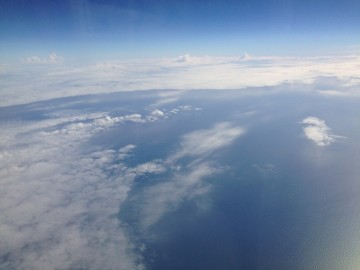
Reflections Over the Atlantic
By Linda Kohanov
In the last month, I’ve been traveling around Europe, meeting a host of wonderful new people and horses, visiting some impressive farms, cities, towns and cathedrals in Holland, Germany, and France, while also reconnecting with a growing community of Eponaquest Instructors in these countries. There are so many charming differences in architecture, cuisine, landscape, and history. But I’ve also been struck by the common struggles, hopes and dreams that swirl beneath the surface of language and culture.
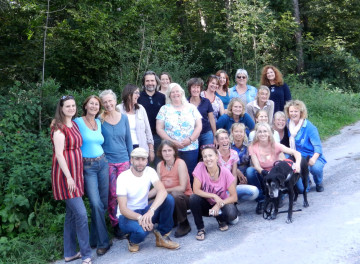
People on both sides of the Atlantic are worried about the violence erupting in Russia and Ukraine, the Middle East, and other places around the globe. At the same time, they’re inspired by the growing freedom we have in the West, due to increasing equality for women and other races, as well as the technology that makes it possible for us to travel more easily, work with greater creativity and autonomy, access unprecedented amounts of information, and connect meaningfully with kindred spirits we might never meet in person.
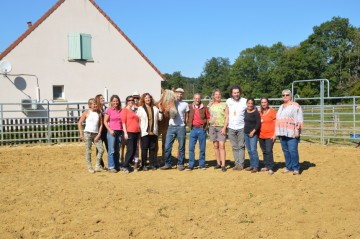
The opportunities that have so many us chomping at the bit, however, are saddled with unexpected challenges. I’ve spoken to a number of talented men and women dealing with bouts of depression. Sometimes these people are literally unable to get out of bed in the morning—not because of a biochemical imbalance, and not because their lives are too restricted, but because the possibilities are immense. Despite how far humanity has come in the last 2500 years, some people feel paralyzed by the knowledge of how much still has to be done.
For others, the traumas of the past rein in their tremendous potential, causing them to question their every move, making it difficult to experiment, to make the mistakes necessary to develop something new, move forward with confidence, and truly believe in themselves.
Physical violence reigns supreme in terrorist organizations, it’s true, but the vast majority of people in the world are grappling with emotional forms of oppression: those stone-age power tools of shame, blame, fear, confusion, regret, and the ever present threat of being ostracized for questioning what is popular, speaking what is unpopular, and most of all, being who they really are.
Over the years, I’ve seen violence erupt simply from the frustration of not knowing what to do differently. I’m not just talking about people who join gangs, commit crimes, throw dishes at their spouses, or drive too fast on the highway. I’m talking about the violence we do to ourselves when the tension between what society tells us we SHOULD be or want contrasts with an inner longing for something that serves a brighter future while challenging the injustices of the status quo.
Suicide is the most serious form of self-violence, of course, but suicide prevention involves much more than paying attention to early warning signs and getting professional help. True prevention demands a radical shift in the way we approach life, the way we treat each other, and the strength we feel in ourselves to meet the joy and sorrows, the ups and downs, the opportunities and difficulties we encounter each and every day.
Self-victimization usually involves more subtle forms of violence: the many clever ways we berate ourselves for failing to meet unrealistic yet decidedly superficial standards (that usually have nothing to do with our own inner callings), and, most importantly, the often unconscious ways we neglect or even refuse to forgive ourselves for past mistakes, let alone learn from them. At the same time, we have trouble finding that delicate balance between forgiving others and holding them accountable for their own hurtful comments and actions. This adds immeasurably to the internal stress we try to either ignore or actively suppress through a variety of unhealthy behaviors and addictions. To change these debilitating patterns, we must develop courage, imagination, emotional and social intelligence, focus, power, and endurance, tools that allow us to meet each and every obstacle with that seemingly paradoxical sense of confidence, humility, awareness, compassion, realism, and optimism that keeps us honest and on track.
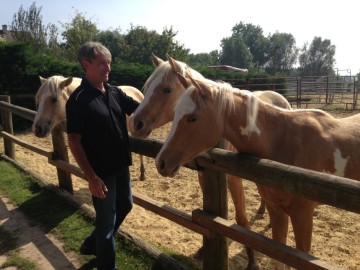
Luckily, as I’ve found, we live in a time when horses are allowed to become our trainers, rather than the other way around. These graceful, sensitive, nonpredatory power animals quite naturally teach something that feels very new to humans, and very old to equines: They show us how to run free, together—encouraging us to support each other as we also express our individuality. When we follow their example, we learn how to protect and nourish our fellow herd members rather than use their vulnerabilities against them (as predators are apt to do). And we learn how to stand up for ourselves—without oppressing others.
As I’ve said many times before, horses embody “Freedom through Relationship.” For humans, this includes relationships with other people, cultures, animals, the earth, and the deepest most authentic part of ourselves. Over the years, however, I’ve also realized that Relationship transcends time, urging us to transform the traumas and support the unrealized dreams of previous generations.
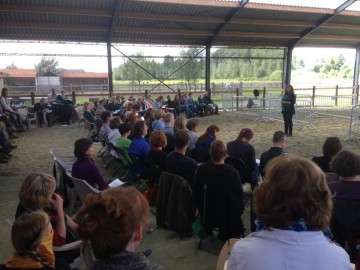
Which brings me to a poem I’d like to share with you. In 1999, when I was writing The Tao of Equus and starting my own equine-facilitated learning practice, I worked with a woman who could not seem to move forward with her own life after her father committed suicide. Somehow this experience opened me to an immense well of pain, the sheer hopelessness of people throughout history who sometimes literally, sometimes “only” emotionally, had been enslaved by the callous ambitions of others—people who were, in either case, unable to live their own lives, or even believe they were worthy of doing so.
That same spring my own mother passed away, and I was keenly aware that she too had grown up in a time when women especially were not expected, or in her case even allowed, to follow their own dreams. And yet, there was a subtle transformation at work. Over the years, she evolved from trying to protect me from the world in my teens and early 20s, to increasingly becoming open, and eventually encouraging, of my efforts to follow my own strange, at-that-time unformed, calling.
It was a bittersweet revolution. During the last few weeks of her illness, there was a deep sense of regret and frustration in my mother: the realization that her own life was coming to an end without reaching the fulfillment of something she never spoke aloud. What dreams might she have expressed, might she have realized if she had been born a few decades later? If she had been my sister or my daughter or my granddaughter, rather than my mother?
For me, the grief I felt following her death was unexpectedly complicated, magnified by the palpable sense of loss for a life she never got to live. And yet, as so often happened when I sat with my mare Rasa and sometimes even cried on her silky black shoulder, new insights and inspirations were flowing along with the tears. The intense feeling of my mother’s regret was slowly replaced with acceptance through a perspective Rasa always conveyed: an appreciation for “what is.” Only the acceptance Rasa communicated came with a much wider view, and I wrote a piece called “Glimpse” as if I were taking dictation.
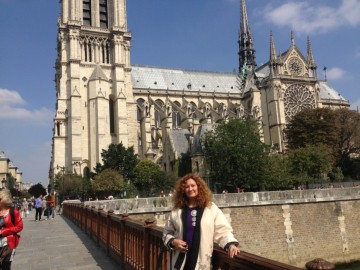
I’ve shared this prose-poem with others over the years, and it seems to inspire a shift that allows people to not just be present with loss, but to do something constructive in its wake. Most recently, I passed it along to a client who was suffering from a depression that seemed both personal and generational, and it struck me that many people might find these words useful in dealing with similar feelings of grief, unrealized potential and debilitating regret.
Deep inside each of us, there’s that individual calling, that simultaneously instinctual and spiritual urge to be who we really are, in all our glory. This is challenge enough, as we all know. But sometimes a calling seems overwhelming for a very good reason: it cannot be fulfilled in a single lifetime. In Chapter One of The Power of the Herd, I wrote about a perspective that acts as a bit of an antidote to this uncomfortable phenomenon: a perspective called “cathedral thinking.”
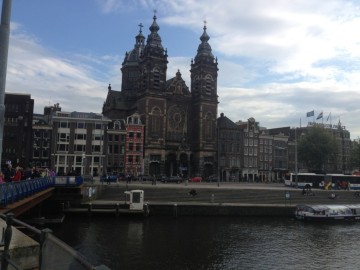
Like the great churches of Europe, which took hundreds of years to build, all truly innovative, socially conscious goals are multi-generational. We can relieve some of the stress and prioritize the steps to success more effectively by recognizing that the visionary impulse often compels us to start something that our children and grandchildren will be asked to fulfill—and only be ABLE to fulfill if we give them the tools they need to excel in life.
At the same time, it’s important to recognize that we also do the life we have been given justice when we make the smallest effort to change an unproductive pattern or harmful belief that was handed down to us.
When our personal goals are balanced by awareness of influences from the past and contributions yet to be made by future generations, we can make better choices in the present. Healing the past and nurturing those who will take the reins in the future is how we all move forward, together.
Glimpse
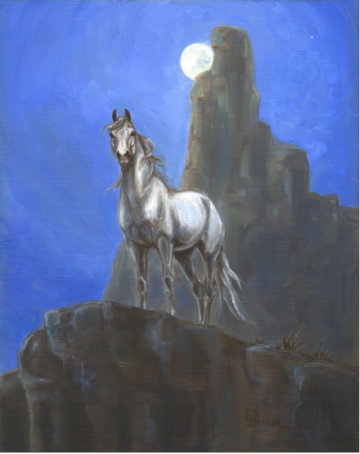
By Linda Kohanov
When we glimpse the end of a life
we cling to what we think we have lost.
All those things we should have said
and all those things
that should have been said to us
echo through the emptiness
that is the space
left by the one who was forced to leave.
Death is an ending.
It is also a beginning.
Because what dies is not the soul
but the patterns of living
that limited the soul.
If we are truly living,
we die every day
to the habits that prevent us
from forgiving and moving on.
Perfection eludes us,
but each generation inches closer to its promise
when the children of those who suffered so profoundly
break the patterns handed down by their ancestors.
When we end
what our mothers and fathers
and their mothers and fathers before them
could not end
the promise of new life
echoes backward through our lineage.
And those who suffered before us
are healed in the Otherworld
as surely as if we had touched their broken bones
and minds and memories
with the elixir of a life that is not only eternal
but free
from the chains of fear and shame
that bound them
whenever they tried to escape
from the life
they thought they were forced to lead.
Copyright 1999 by Linda Kohanov
For more information on Linda’s upcoming workshop The Power Behind Nonviolence.
For a series of photos and reflections on Linda’s travels through Europe, check out the Eponaquest Worldwide Facebook page at https://www.facebook.com/EponaquestWorldwide.
—